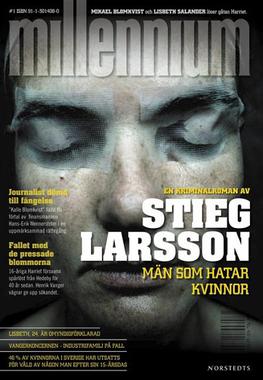Kudos to whoever came up with this cover. It's vibrant and slightly punkish but respectable.
The Girl With The Dragon Tattoo is definitely worth reading, but it's not without it's faults. It's difficult to sum up the premise with a neat one line summary, but the book is a locked-room murder mystery that fleas from conventional characters, situations and plot structures. These are good things, but it takes Larson a long damn time to get to the main story, and the first few chapters are packed with exposition about a financial journalism subplot that bookends the main mystery, and when we do reach the main mystery, there is even more exposition to set it up. Later on, there is even more exposition about legal guardianship in Sweden. His explanations are clear and they make sense, but they need more editing in accordance with the old "less telling, more showing" maxim.
Along similar lines, the two tangentially related plot threads take a long time to intertwine. We know main characters Mikhail Bloomkist and Lisbeth Salander will eventually end up working together from the moment each character is introduced, but they don't team up until the last quarter of the narrative. Consequently, throughout the book I found myself waiting for Larson to get to the point. The constant switching back and forth between perspectives derailed the narrative momentum of the mystery, resulting in an investigation that was remarkably laid-back, low-key and not terribly suspenseful until the end. There may very well be subtleties in play that I am too impatient to notice, but the pacing frustrated me frequently.
A prettier cover, but much more conventional. The girl doesn't look like the titular heroine either.
It's the characters that really make the story. Mikhail Bloomkist is a charming, intelligent everyman with a uniquely complicated history. In addition to being a disgraced, famous financial journalist, he is a divorced father, an editor, an occasional lover to his magazine's co-owner, and a former soldier, currently working as an informal private eye/biographer. The titular dragon tattooed girl, Lisbeth Salander, is the real crown jewel of the piece, however. She is a laconic, blunt and rebellious hacker/researcher who has been declared incompetent by the government due to her repeated run-ins with the law, and her refusal to emotionally connect with anybody. My greatest complaint of the story is not that so much time is spent in exposition, but that the exposition robs us of time we could be spending with Salander as she hacks computers and takes out bullies with her own brutal brand of justice. Incredibly enough, the secondary and tertiary characters in the novel are comparably well-developed to the main duo. The supporting cast is uniquely likable and believably flawed, while the villains are sick, repellent fucks.
Larson's gift for characterization extends to an ability to create meticulously complicated interpersonal relationships for his characters. Every interaction in the book, from casual business negotiation to rape is credible and realistic. It must be noted that this work has been translated from Swedish to English, and while some credit must be given to translator Steven Murray, the fact that these exchanges can emerge from translation so handsomely is a testament to Larson's ability to convey genuine human emotion.
I don't want to delve too deeply into the specifics of the plot here, seeing how it's a murder mystery, but as I mentioned at the beginning of this post, the original Swedish title of the book is a more accurate portrayal of the novel. The plot accurately portrays the lingering evils of misogyny in society without belaboring the point, and Lisbeth Salander is a sober and compelling modern feminist.
All in all, The Girl With the Dragon Tattoo is a rewarding experience, if a bit slow at times. I haven't seen the Swedish movie adaptation, but I have it on good authority that it is a good watch with dead-on casting. It's also playing in artsy theaters now, so give it a watch if I have intrigued you and you don't like books. In the interest of full disclosure, foreign films frequently contain subtitles, so you may still have to do some reading.



No comments:
Post a Comment